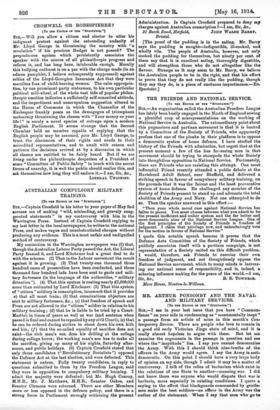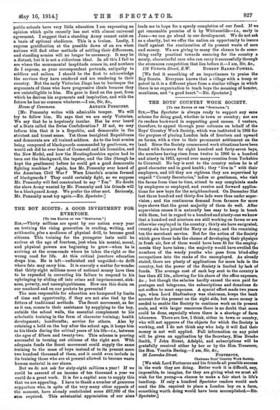MR. ARTHUR PONSONBY AND THE NAVAL AND MILITARY SERVICES.
[To TEN Minos or TH1 ..Srscrarox."] SIR,—I see in your last issue that you have " Common- Sense " on your side in condemning as •' monumentally inept" a passage from an article of mine in this month's Con- temporary Review. There are people who love to remain in a good old early Victorian Jingo state of mind, and it is really almost hopeless to argue with them. But let me examine the arguments in the passage in question and see where the " ineptitude" lies. I say you cannot democratize the Army. With this I should think pine-tenths of the officers in the Army would agree. I say the Army.is,anti- democratic. On this point I should have a very large body of opinion on my side, though I admit it may be a matter of controversy. I talk of the relies of barbarism which exist in the relations of one State to another—meaning war. I did not know there was anyone who would dispute that war is barbaric, more especially in existing conditions. I quote a saying to the effect that blackguards commanded by gentle- men make the beet soldiers—an officer in the Army was the author of the statement. When I say that men who go tG
public schools have very little education I am expressing an opinion which quite recently has met with almost universal agreement. I suggest that a standing Army cannot exist on a basis of optional obedience. This is a truism. Lastly, I express gratification at the possible dawn of an era when nations will find other methods of settling their differences, and standing armies will no longer be necessary. It may be a distant, but it is not a ridiculous ideal. In all this I fail to see where the monumental ineptitude comes in, and nowhere do I express, as your correspondent pretends, antipathy to soldiers and sailors. I should be the first to acknowledge the services they have rendered and are rendering to their country. But the early Victorian Jingo has to burlesque the arguments of those who have progressive ideals because they are unintelligible to him. His gaze is fixed on the past, from which he derives his arguments and inspiration, and with the future he has no concern whatever.—I am, Sir, Ito, [Mr. Ponsonby writes with admirable temper. We will try to follow him. He says that we are early Victorian. We say that he is hopelessly insular. Has he ever heard of a State called the Swiss Confederation P If not, we may inform him that it is a Republic, and democratic in the strictest and truest sense. Yet those benighted Republicans and democrats are all trained soldiers. As to the best armies being composed of blackguards commanded by gentlemen, we would ask did he ever hear of Cromwell and his Ironsides, and the New Model, and how the Huntingdonshire squire had to turn out the blackguard, the tapster, and the like (though he kept the gentlemen) before he could get a good democratic fighting machine ? Again, has Mr. Ponsonby ever heard of the American Civil War P Were Lincoln's armies formed of blackguards ? They could certainly fight, so we suppose Mr. Ponsonby will feel constrained to say "Yes." No doubt the slave Army wanted by Mr. Ponsonby and his friends will be a blackguard Army. We prefer the other sort. Seriously, Mr. Ponsonby must try again.—En. Spectator.]











































 Previous page
Previous page